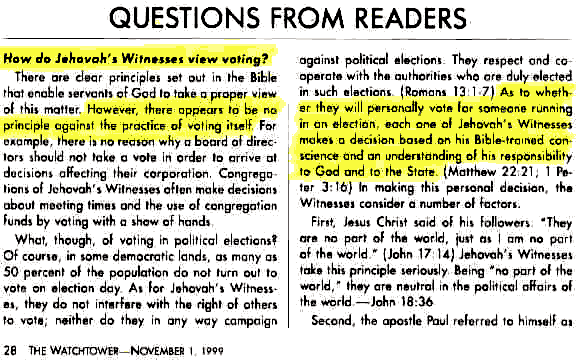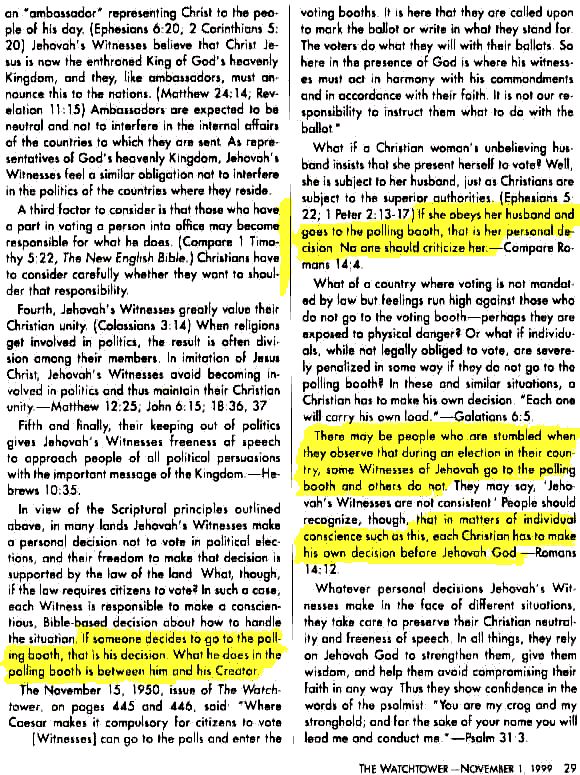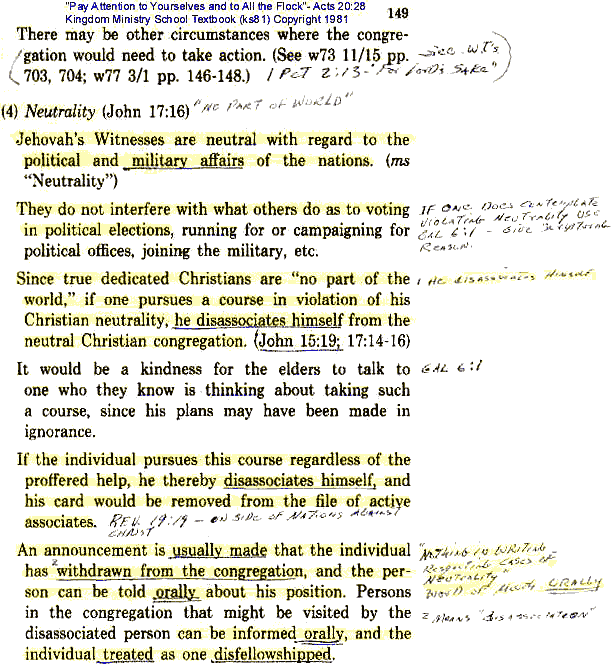If jws live in a country where voting is required by law, jws are allowed to vote, perhaps writing in "Jesus Christ" or "God's Kingdom." In countries without such laws, a jw found voting could be considered to have disassociated themselves.
*** w64 5/15 p. 308 par. 20 Maintaining Unity in Difficult Times ***
20
To mature Christians, the question of what attitude should be taken in the matter of political elections presents no issue. In totalitarian countries oftentimes people are forced by law to go to the election polls and sometimes persons are even picked up at home and brought to the polls. Even in certain democracies the law makes it compulsory for the citizens to go to the election places. In no country do Jehovah’s witnesses take part in politics. They are not of this world. (John 17:14) Therefore they do not take part in voting at elections. They do not compromise their neutral standing in matters of politics, however, if they go to the polls and make the ballot void in some manner, either by crossing it out or by putting down, for example, the words "For God’s Kingdom." That is telling what he is for. By doing this their ballot will become void; it will not count in the election of a man. They have complied with the law and gone to the polls and likely avoided punishment. Remember Jesus’ counsel: "Look! I am sending you forth as sheep amidst wolves; therefore prove yourselves cautious as serpents and yet innocent as doves." (Matt. 10:16) No one should be condemned for acting so. "But why do you judge your brother? Or why do you also look down on your brother? For we shall all stand before the judgment seat of God."—Rom. 14:10.
*** w99 11/1 pp. 28-29 Questions From Readers ***
How do Jehovah’s Witnesses view voting?There are clear principles set out in the Bible that enable servants of God to take a proper view of this matter. However, there appears to be no principle against the practice of voting itself. For example, there is no reason why a board of directors should not take a vote in order to arrive at decisions affecting their corporation. Congregations of Jehovah’s Witnesses often make decisions about meeting times and the use of congregation funds by voting with a show of hands.
What, though, of voting in political elections? Of course, in some democratic lands, as many as 50 percent of the population do not turn out to vote on election day. As for Jehovah’s Witnesses, they do not interfere with the right of others to vote; neither do they in any way campaign against political elections. They respect and cooperate with the authorities who are duly elected in such elections. (Romans 13:1-7) As to whether they will personally vote for someone running in an election, each one of Jehovah’s Witnesses makes a decision based on his Bible-trained conscience and an understanding of his responsibility to God and to the State. (Matthew 22:21; 1 Peter 3:16) In making this personal decision, the Witnesses consider a number of factors.
First, Jesus Christ said of his followers: "They are no part of the world, just as I am no part of the world." (John 17:14) Jehovah’s Witnesses take this principle seriously. Being "no part of the world," they are neutral in the political affairs of the world.—John 18:36.
Second, the apostle Paul referred to himself as an "ambassador" representing Christ to the people of his day. (Ephesians 6:20; 2 Corinthians 5:20) Jehovah’s Witnesses believe that Christ Jesus is now the enthroned King of God’s heavenly Kingdom, and they, like ambassadors, must announce this to the nations. (Matthew 24:14; Revelation 11:15) Ambassadors are expected to be neutral and not to interfere in the internal affairs of the countries to which they are sent. As representatives of God’s heavenly Kingdom, Jehovah’s Witnesses feel a similar obligation not to interfere in the politics of the countries where they reside.
A third factor to consider is that those who have a part in voting a person into office may become responsible for what he does. (Compare 1 Timothy 5:22, TheNewEnglishBible.) Christians have to consider carefully whether they want to shoulder that responsibility.
Fourth, Jehovah’s Witnesses greatly value their Christian unity. (Colossians 3:14) When religions get involved in politics, the result is often division among their members. In imitation of Jesus Christ, Jehovah’s Witnesses avoid becoming involved in politics and thus maintain their Christian unity.—Matthew 12:25; John 6:15; 18:36, 37.
Fifth and finally, their keeping out of politics gives Jehovah’s Witnesses freeness of speech to approach people of all political persuasions with the important message of the Kingdom.—Hebrews 10:35.
In view of the Scriptural principles outlined above, in many lands Jehovah’s Witnesses make a personal decision not to vote in political elections, and their freedom to make that decision is supported by the law of the land. What, though, if the law requires citizens to vote? In such a case, each Witness is responsible to make a conscientious, Bible-based decision about how to handle the situation. If someone decides to go to the polling booth, that is his decision. What he does in the polling booth is between him and his Creator.
The November 15, 1950, issue of TheWatchtower, on pages 445 and 446, said: "Where Caesar makes it compulsory for citizens to vote . . . [Witnesses] can go to the polls and enter the voting booths. It is here that they are called upon to mark the ballot or write in what they stand for. The voters do what they will with their ballots. So here in the presence of God is where his witnesses must act in harmony with his commandments and in accordance with their faith. It is not our responsibility to instruct them what to do with the ballot."
What if a Christian woman’s unbelieving husband insists that she present herself to vote? Well, she is subject to her husband, just as Christians are subject to the superior authorities. (Ephesians 5:22; 1 Peter 2:13-17) If she obeys her husband and goes to the polling booth, that is her personal decision. No one should criticize her.—Compare Romans 14:4.
What of a country where voting is not mandated by law but feelings run high against those who do not go to the voting booth—perhaps they are exposed to physical danger? Or what if individuals, while not legally obliged to vote, are severely penalized in some way if they do not go to the polling booth? In these and similar situations, a Christian has to make his own decision. "Each one will carry his own load."—Galatians 6:5.
There may be people who are stumbled when they observe that during an election in their country, some Witnesses of Jehovah go to the polling booth and others do not. They may say, ‘Jehovah’s Witnesses are not consistent.’ People should recognize, though, that in matters of individual conscience such as this, each Christian has to make his own decision before Jehovah God.—Romans 14:12.
Whatever personal decisions Jehovah’s Witnesses make in the face of different situations, they take care to preserve their Christian neutrality and freeness of speech. In all things, they rely on Jehovah God to strengthen them, give them wisdom, and help them avoid compromising their faith in any way. Thus they show confidence in the words of the psalmist: "You are my crag and my stronghold; and for the sake of your name you will lead me and conduct me."—Psalm 31:3.


